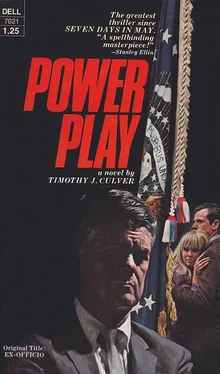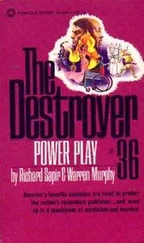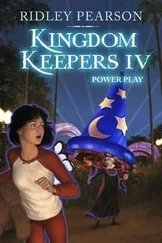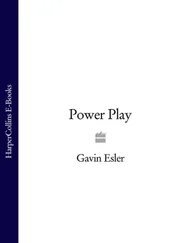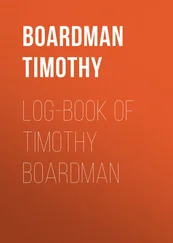Timothy Culver - Power Play
Здесь есть возможность читать онлайн «Timothy Culver - Power Play» весь текст электронной книги совершенно бесплатно (целиком полную версию без сокращений). В некоторых случаях можно слушать аудио, скачать через торрент в формате fb2 и присутствует краткое содержание. Город: New York, Год выпуска: 1971, ISBN: 1971, Издательство: Dell Books, Жанр: roman, на английском языке. Описание произведения, (предисловие) а так же отзывы посетителей доступны на портале библиотеки ЛибКат.
- Название:Power Play
- Автор:
- Издательство:Dell Books
- Жанр:
- Год:1971
- Город:New York
- ISBN:978-0440070214
- Рейтинг книги:5 / 5. Голосов: 1
-
Избранное:Добавить в избранное
- Отзывы:
-
Ваша оценка:
- 100
- 1
- 2
- 3
- 4
- 5
Power Play: краткое содержание, описание и аннотация
Предлагаем к чтению аннотацию, описание, краткое содержание или предисловие (зависит от того, что написал сам автор книги «Power Play»). Если вы не нашли необходимую информацию о книге — напишите в комментариях, мы постараемся отыскать её.
Occupation: Former President of the United States
Problem: Obsessive desire for power.
Loved and hated more than any man on earth, commanding absolute loyalty from the men and women who once had served him, defying the government he once had headed, Bradford Lockridge pursued his final and possibly insane vision of glory...
Power Play — читать онлайн бесплатно полную книгу (весь текст) целиком
Ниже представлен текст книги, разбитый по страницам. Система сохранения места последней прочитанной страницы, позволяет с удобством читать онлайн бесплатно книгу «Power Play», без необходимости каждый раз заново искать на чём Вы остановились. Поставьте закладку, и сможете в любой момент перейти на страницу, на которой закончили чтение.
Интервал:
Закладка:
Ten minutes. He ran for the bathroom again, shedding clothing on the way.
iii
The trip, all in all, took an hour and a half. Their route skirted every town along the way, so that once out of Lancashire they didn’t see another populated area until they arrived at Eustace, which turned out to be a surprisingly sleepy little town that obviously hadn’t allowed the international fame of one of its citizens to alter its style and pace. Robert sat forward as they drove through town, his elbows on the seat back, and said, “Take away the automobiles and you could make a movie here and call it 1925.”
Sterling, at the wheel, chuckled and nodded, but Elizabeth said, “That’s better than calling it 1984.” At sixty-two, five years younger than her husband, Elizabeth was a tall and straight and slender woman, her face very little lined, her hair gray but well-cared-for, her mental faculties and political impatiences intact.
Robert looked at her grim profile in some surprise. “Do you really think that’s a possibility?”
“More and more every day,” she said, and turned to glance at him; he saw her eyes take in his crewcut.
“I’ll grant you we’re on a swing away from liberalism,” Robert said, “but it’s only a swing. The country is heading for conservatism again, but sooner or later the pendulum will start back. It always does. America has always had its Know Nothing party, and it’s always had its Abolitionists.”
Elizabeth’s expression was cynical. “The right-wingers want to stop the clock entirely, you know, and one of these times they’ll make it. Then the pendulum won’t come back at all. That’s what Orwell was talking about.”
“I don’t see it happening,” Robert said. “I know the political history of this country, and the whole story is summed up in the pendulum swinging between left and right.”
“The reason I worked for Eugene McCarthy,” Elizabeth said, “is because he was the only man in public life to stand up and say that kind of thinking was fuzzy-headed and dangerous. Complacency will do more harm to this country than a full-scale atomic attack.”
Sterling, humor in his voice, said, “Robert, for God’s sake don’t get her started now. She gives poor Brad enough hell every time they meet as it is, for not bringing peace on Earth during his administration.”
“If any one man on the planet could do it,” Elizabeth said fiercely, “it’s the President of the United States. He’s the only one with anything approaching the power, the public attention and the prestige. I’ve told Brad that before, and I’ll tell him again. The hour is too late for politics as usual.”
“See what you’ve done,” Sterling said, looking at Robert in the rearview mirror. “On your head be it.”
“Oh, don’t worry, I’ll be good,” Elizabeth said. “It’s too late for him now, he’s missed his opportunity. I’ve told him that, too, more than once. Besides, this is Robert’s day. I promise I won’t hog the conversation.” She turned to smile at Robert, who smiled back, and the car slowed.
Looking out through the windshield, Robert saw that they were now on a gravel road surrounded by trees, and that just ahead was a chain-link fence with a gate closed across the road. An elderly man in a gray uniform without markings was just coming out of a small shack beside the gate. He peered at the car, and evidently recognized either it or Sterling, because all at once he began huge pantomime nods and waves, during which he stumped to the gate and slowly swung it open.
Robert said, “What if we were kidnappers? Or assassins?”
Sterling said, “He has a gun and a telephone. And there are Secret Service men up at the house.”
Elizabeth shook her head, smiling, and said over her shoulder to Robert, “It’s only Bradford up there. The moment has passed for all that, too. No kidnappers, no assassins any more.”
iv
They had lunch in a second floor room overlooking the orchards, with the Tuscarora Mountains for a backdrop. They were six at table.
Bradford Lockridge sat at the head of the table, with Robert to his left. It was Robert’s first experience of being in the same room with a face completely familiar but heretofore seen only in photographs or on television, and he kept being surprised that he recognized the man.
Bradford Lockridge had a strong face, big-boned and square-jawed, almost an American Gothic face, and a long broad body to go with it. His hands were surprisingly gnarled and knobby, the hands of a farmer rather than a politician, but he moved them gracefully, he moved his entire body in a way lighter and more delicate than his appearance would suggest. The familial resemblance between him and Sterling, now sitting opposite him at the foot of the table, was very close, except that all of the features that were strong in Bradford were softer and more gentle in Sterling.
To Lockridge’s right, opposite Robert, sat Howard Lockridge, Sterling’s older son. It had been a surprise to Sterling and Elizabeth to find him here, and they’d explained to Robert that Howard was Bradford’s editor on his memoirs. He’d brought down the galleys on Bradford’s new volume, The Temporary Peace, and though he tried to be gracious about it, Robert could tell he wasn’t pleased at having his work interrupted this way. He’d managed twice before lunch to tell Robert that the book was running badly behind schedule, as though Robert wouldn’t be tongue-tied enough as it was.
To Robert’s left sat Elizabeth, enjoying life as usual, even enjoying her son’s badly dampered irritation and once or twice poking quiet fun at him for it, winking at Robert to make him willy-nilly a co-conspirator. And completing the table, sitting opposite Elizabeth and catty-corner from Robert, was a woman who looked to be about thirty, named Evelyn Canby. She’d been introduced as Bradford Lockridge’s granddaughter, and Elizabeth had explained in an aside that Mrs. Canby’s husband had died something over a year ago in Southeast Asia.
Mrs. Canby also had a daughter, a little girl named Dinah who’d just turned four last month and who was a solemn quiet little child who’d been brought in for introductions and then ushered right back out again. Usually Robert professed himself relieved that his marriage to Kit had produced no children — their emotional attitude toward one another had never stabilized sufficiently for them to feel secure about adding such a volatile third element — and of course he was right to be relieved, since the split would have had to be much more complex and un-final if there had been a child to consider, but on those rare occasions when he was introduced to a young child he invariably found himself totting up his own years — thirty-one next month, thirty-one — and thinking that the time to start a family was fast slipping away.
But a child was such a complication. As witness Mrs. Canby herself. A pleasantly attractive woman, widowed for over a year, she had obviously made no effort yet to find herself another man — burying herself away in the woods here, for one thing, and wearing such plain clothing and sparse make-up and obsolete hair styling — and that was surely, Robert thought, because she had a child. Without Dinah to occupy her time and attention, where would she be now? In New York or Washington or Philadelphia, some urban center in the BosWash megalopolis, finding herself a man.
Though that wasn’t necessarily true. He had no child to tie him down, he’d been divorced nearly three years now, and had he done very much yet toward finding another woman? Of course, the situation was different in his case, but still—
“What do you think, Robert?”
He looked up, startled, to see that they were all looking at him, and that Elizabeth had just asked him a question. A conversation had been going on around him while he daydreamed, but he had no idea even what the subject had been. “I’m sorry,” he said. “My mind was wandering.”
Читать дальшеИнтервал:
Закладка:
Похожие книги на «Power Play»
Представляем Вашему вниманию похожие книги на «Power Play» списком для выбора. Мы отобрали схожую по названию и смыслу литературу в надежде предоставить читателям больше вариантов отыскать новые, интересные, ещё непрочитанные произведения.
Обсуждение, отзывы о книге «Power Play» и просто собственные мнения читателей. Оставьте ваши комментарии, напишите, что Вы думаете о произведении, его смысле или главных героях. Укажите что конкретно понравилось, а что нет, и почему Вы так считаете.
